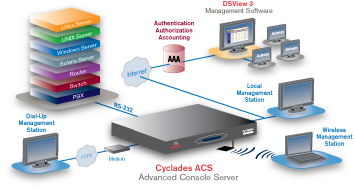Linux-based console servers boast software-configurable pin-outs
Mar 18, 2008 — by Eric Brown — from the LinuxDevices Archive — 17 views Avocent is shipping a new line of Linux-based console servers that are said to streamline reconfigurations for remote serially-attached devices. The Cyclades ACS 6000 series supports software configurable cabling pin-outs, and further speeds configuration, says Avocent, by automatically identifying the remote asset… hostnames.
Avocent is shipping a new line of Linux-based console servers that are said to streamline reconfigurations for remote serially-attached devices. The Cyclades ACS 6000 series supports software configurable cabling pin-outs, and further speeds configuration, says Avocent, by automatically identifying the remote asset… hostnames.
(Click for larger view of ACS 6048)
The ACS 6000 series, which comes in 48-, 32-, and 16-port configurations, can remotely manage devices capable of being configured to redirect console output to a serial port. Such devices include Linux, UNIX, and Sun Solaris servers, as well as networking equipment such as routers, switches, firewalls, and private branch exchange (PBX) telecom equipment.
The new ACS 6000 devices enable faster, less expensive deployments, says the company, by easing the complexity of multi-vendor, multi-platform data center management. Instead of manually re-cabling server racks, data center managers can use software to reconfigure pin-outs for, say, Cisco routers. This capability is an industry first, the company claims. Another touted feature is auto discovery of asset hostnames, so data center personnel can avoid manually locating and naming target devices.


ACS 6048 and ACS 6032
(Click either to enlarge)
For “out-of-band” management, there's an optional built-in modem, as well as a PCMCIA slot. Unlike “in-band” approaches such as RDP (remote desktop protocol), OOB management lets users reboot servers and adjust BIOS settings.
Additional features include:
- Policy-based access controls with multiple pre-determined and customizable secure access levels, data and event logging, and real-time monitoring
- X.509 SSH certificate support, SSHv1 and SSHv2, Two-Factor Authentication (RSA SecurID), and Local, RADIUS, TACACS+, LDAP/AD, NIS and Kerberos authentication
Additionally, Avocent has introduced a stripped down ACS 5000 line without the full enterprise-level access and security capabilities listed above. Both series offer the option of Avocent's DSView 3 management software, which is said to offer a “hub and spoke architecture” for IT management. The software can accomplish real-time load balancing, says Avocent, by supporting authentication through up to 15 mirrored spoke servers.

Typical ACS 6000 environment
Avocent is known primarily for its Linux-based “DSR” series KVM (keyboard, video, mouse) servers for remotely managing Windows-based servers. Avocent greatly expanded its console product line when it acquired Cyclades in January 2006. Today, Avocent claims that its serial console server products help manage more than 2 million servers, routers and switches in data centers worldwide.
Basic hardware specs for the ACS 6000 include:
- Memory — 28MB NAND flash; 256 MB DDR-2
- Networking — 2 x 10/100/1000BT Ethernet on RJ45
- Serial interfaces — 1 RS-232 serial console port on RJ45; 1 AUX RS232 port on RJ45 or internal modem V.92 port on RJ45 (RJ11 compatible); 16, 32, or 48 RS232 console ports on RJ45
- USB — 1 x USB 2.0 Host
- Other I/O — 2 x PC Card / CardBus with ejector (dual Type II or single Type III)
- Dimensions — 1.8 x 17.3 x 9.5 inches (6 x 21 x 11 cm)
- Weight — 6.6 lbs
- Operating temperature — 32 to 122 degrees F (0 to 50 degrees C)
- Power — internal 100-240 VAC, 50/60 Hz (optional -48 VDC power supply)
- Operating system — “hardened” embedded Linux
Stated Dave Perry, Avocent's EVP/GM of Management Systems, “Customers have asked for help with speeding deployment and repurposing of data center assets and our ACS 6000 models meet that need while also enhancing availability and security.”
Availability
The ACS 6000 and 5000 series are available now with prices ranging from about $2,500 to $3,500 for the 16-port ACS 6016; $3,180 to $4,160 for the 32-port ACS 6032; and $4,640 to $5,620 for the 48-port ACS 6048. More information may be available here.
This article was originally published on LinuxDevices.com and has been donated to the open source community by QuinStreet Inc. Please visit LinuxToday.com for up-to-date news and articles about Linux and open source.